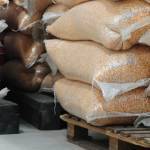Providing Dietary Protein to Horses

Owners of dogs and cats know that their pets are carnivores—meat eaters—and commercially available food for these animals contains high protein levels similar to what would be found in the diets of wild felines and canines. Horses, on the other hand, are herbivores—plant eaters—and at first glance, it would not seem that grass, the most natural equine diet, would contain a great deal of protein.
However, grasses and legumes, either fresh or dried, usually do contain enough protein for maintenance of idle or lightly worked horses. Grass has a low to medium level of protein and does not contain a large amount of lysine, an essential amino acid. Alfalfa or lucerne, a legume, is an excellent source of protein, with levels that can approach 18 to 20 percent in the best-quality hay. Since horses need only about 10 or 11 percent crude protein as adults, and about 12 to 14 percent during growth, alfalfa could easily supply most or all protein requirements, though a straight alfalfa diet is not balanced for other nutrients.
In general, a mature horse doing little work needs only enough protein to maintain body tissues. Requirements for protein go up as horses are put into an exercise program, and the need increases with the workload because these active horses must build lean muscle tissue. Breeding stallions and late-pregnant mares need protein levels similar to those of horses in moderate to heavy exercise. Lactating mares have the highest protein requirement, up to twice as much as a mature horse in moderate exercise. Finally, growing horses need high-quality protein as they increase in size and weight.
The National Research Council’s Nutrient Requirements of Horses contains guidelines for the amount of crude protein needed by horses of every size, age, stage of growth, reproductive status, and exercise level. Horse owners don’t need to pick up a copy of this publication, however, if they purchase horse feed that has been formulated and produced by a reputable manufacturer. Feed bags and labels indicate the type and amount of feed necessary to meet the needs of many classes of horses, from mature/idle to growing, lightly worked, heavily exercised, breeding, or retired equines.
Supplementing a forage-based diet by feeding a concentrate according to the bag’s directions will usually provide sufficient protein. Knowing that their equines need more protein than idle animals, owners of hard-working sport horses or lactating mares may wonder whether they should boost dietary protein levels through the use of special protein or amino acid supplements. Studies in both horses and human athletes have shown that this type of supplementation has little or no positive effect.
However, the intensity of the actual training program in that study is somewhat difficult to interpret. Several research experiments conducted at Kentucky Equine Research (KER) and other locations have examined the effects of dietary protein on metabolic responses to exercise. In two of these studies, lactate accumulation during exercise was lower when horses received a diet containing a high level of protein, but in a third study, lactate accumulation was unaffected by dietary protein level. In the KER study, it was found that muscle glycogen was somewhat lower in horses receiving a high-protein diet, while another study showed no effect of protein level on muscle glycogen concentration. At this point, there are no solid research data to support the theory that protein supplementation may be beneficial to equine athletes. Even in human athletes, benefits have only been sporadically reported. Because the branched-chain amino acids are the primary amino acids catabolized during exercise, researchers have also evaluated supplementation of these amino acids (especially leucine). Horses receiving a branched-chain amino acid supplement had lower lactate levels than unsupplemented horses in one study, but this study involved only mild exercise, so results might not apply to heavily worked horses. Further research in this area may turn up some positive benefits of protein supplementation, but at present, there is no recommendation for this practice.








